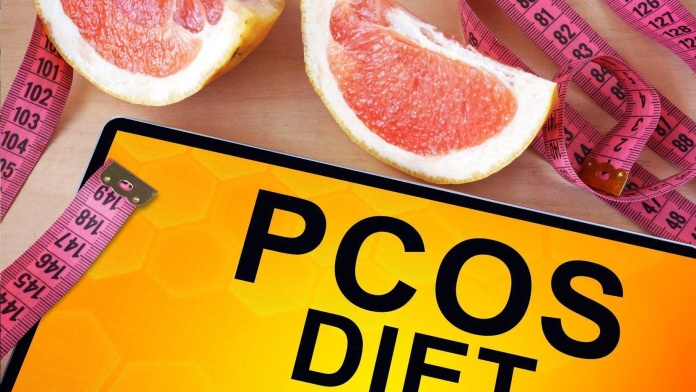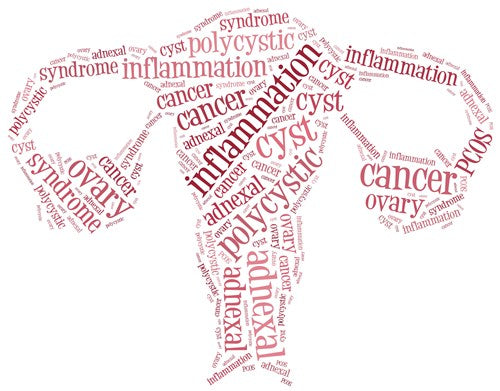
Polycystic ovarian syndrome (PSCOS), how to optimise your diet & training
Polycystic Ovarian syndrome is a relatively common condition affecting up to around 20% of women, caused by elevated androgen levels. Risk Factors include obesity, inactivity and heredity.
This is a complex syndrome experienced by many females and seeing as we often get questions about it in the BTN community I thought a post on it would be helpful to both sufferers and trainers who have clients with this condition and want to know how best to help them- like myself.
So to start with…
What is PCOS?
PCOS is an endocrine disorder and inflammatory condition diagnosed by the presence of at least two out of three ‘markers’; namely high androgen levels, ovarian cysts and absent ovulation. It appears to be at least partly genetic (3), largely evidenced by higher incidence in monozygotic twins than dizygotic (identical vs ‘regular’ twins) but lifestyle factors such as obesity can worsen the effects. Elevated testosterone levels in women lead to a number of issues including:
- Irregular periods, heavy periods or no periods at all
- Increased facial hair and hair on other areas such as the chest & back in some cases due to the higher levels of testosterone
- Problems with fertility
- Higher blood pressure
- Higher cholesterol
- Acne
- Inability to lose weight
- Insulin resistance
- Male-pattern fat storage and increased visceral fat
One of the most well known issues is ovarian cysts, and owing to the name you may be forgiven for assuming that the ovaries are the main issue, this is not the case. The ovarian cysts which PCOS are named for only occur in around 15% of women and even in those individuals, removal of the ovaries entirely does not eliminate all issues. Furthermore, these are not actually cysts, but are actually underdeveloped follicles which have not developed fully into oocytes due to impaired ovarian function. They look a little like pearls under ultrasound.
Polycystic Ovaries are a symptom, nothing more. The condition isn’t fully understood but it appears to originate with hormonal regulation in the hypothalamus.
What are the causes of PCOS?
While the actual root cause is not fully understood, there is a relatively well understood pathogenesis. Excessive testosterone is produced from the ovaries due to genetic tendencies but also excessive luteinizing hormone released from the anterior pituitary gland and excessive blood insulin levels. In fact, the majority of women with PCOS are obese, and those who are normal weight are still commonly found with insulin resistance to some degree (as mentioned, this is still exacerbated by obesity). Chronically elevated insulin levels can disrupt the usual function of the HPO axis (the hypothalamic-pituitary-ovarian axis. Basically, three organs which control each other with a hormonal system of checks and balances). This elevated insulin leads to:
- Increased FSH-RH production, which in turn leads to a larger amount of Luteinising hormone (LH), which is one of the key hormones in regulating menstruation and ovulation. This causes a LH dominance over Follicular Stimulating Hormone, which basically means to overproduction of follicles which are unable to mature, leading to the appearance of ‘cysts’
- Decreased Sex Hormone Binding Globulin binding, which results in increased serum androgen levels and the associated symptoms
- Difficulty losing weight, and central obesity which is associated with increased risk of mortality, and of course to worsening PCOS symptoms
Excessive fat also leads to increased production of aromatase which is able to convert the excess testosterone to estradiol (a kind of estrogen) meaning that women with PCOS are commonly found with both elevated testosterone AND elevated estrogen, which compounds issues further. Neither hormone is ‘bad’ per se, but excessive anything is a bad thing by definition.
As a coach, a client with PCOS will generally present with slow or impaired fat loss, fatigue, issues regulating mood and potential self-esteem issues resulting from androgenic symptoms like excess hair.
How do I manage PCOS?

It is important to remember that a client with PCOS can lead a normal and healthy life.
The easiest way to manage this is to break it down into phases:
Protocol:
Phase 1: balancing insulin(1)
- Consider following the protocols of a Paleo style, Mediterranean or otherwise controlled carbohydrate diet in order to steady and regulate blood sugar levels. As insulin is produced in response to carbohydrate intake, by controlling insulin levels we can effectively control PCOS to a certain degree. A diet that is predominantly higher in fats and proteins, along with a leaning towards ‘clean’ foods is an effective way to tackle PCOS
- Reducing refined sugars in the diet is an important step, here
- Reducing consumption of large amounts of dairy in isolation (large pots of Greek Yoghurt or glasses of milk without an accompanying meal, for example) may be considered as these can have large effects on serum insulin levels
- Include cruciferous veg, broccoli, cauliflower, etc. with as many meals as possible, with the majority of carbohydrates coming from vegetables, pulses, tubers and a small amount of whole grains. A low GI diet seems to be effective for PCOS
- This can be done alongside medical intervention including birth control and/or metformin, with a view to have medication re-evaluated by a GP periodically
Phase 2: Improving insulin sensitivity
After the first few weeks you can then think about adding the following:
- Increasing exercise in order to improve insulin sensitivity. Exercise in any form is beneficial to sufferers. There has been negativity about high intensity high impact exercise such as Crossfit and also strength training due to the possible increase in androgens but if you (or your client) love lifting weights then why would you ask them to give that up in order to do something they hated? Remember when it’s consistency in any lifestyle factor we are after- we always want to be doing something that is sustainable and therefore enjoyment is a huge factor. We need to consider here, however, that owing to elevated androgen levels, a woman with PCOS will probably gain muscle much more easily than other women and this could be off-putting. Some clients will like this, as they will gain strength and improve performance much faster than other women, but the perception of a ‘masculising’ effect of muscle mass may be a concern. If this is the case, other exercise forms such as swimming or circuit training could be a good bet. Utimately, though, it is activity levels rather than exercise specifically which will cause improvement for PCOS sufferers. Advising the use of an activity tracker which promotes walking is wise, as daily activity should be encouraged. A client who is hitting their ‘10,000 steps’ every day will be in a much better position than one who trains hard 2-3 times per week and is otherwise sedentary
- Ensuring that you/your client are eating a diet with high quality protein sources and other food sources in general. Organic everything is not necessary but the inclusion of fresh lean meats and large amounts of vegetables is key
- Fasting protocols can be efficacious to increase fat loss success. The 5:2 diet protocol or a daily fast such as Martin Berkhan’s 16:8 can be considered, though they are by no means vital or inherently ‘better’
Phase 3: Ongoing management
After a few weeks, results should be weight loss (in over weight clients), skin symptoms clearing up and a general improved sense of well-being.
- More carbohydrates including fruits can be increased in the diet and fats can be lowered to have a more level balanced ratio as a client gets leaner if they would prefer this setup, as this reduction in bodyfat will improve insulin regulation to some degree
- Dairy products can be increased again, too
- Careful management of caffeine is always preferable although sufferers can be tolerant of certain decaffeinated products and lightly caffeinated drinks such as green teas, etc.
- Regular exercise is still important, as regular exercise is hugely important for weight loss sustainability
A note on stress management
PCOS, like a lot of other conditions, carries with it a significant psychological impact. Women with PCOS often feel like they are not in control of their own body, owing to difficulty with fat loss and lethargy along with potential issues achieving natural conception. Just as importantly, the ‘masculising’ effects of high testosterone (increased body and facial hair) can cause a large psychological burden.
Simple mindfulness/stress management techniques can go a long way towards alleviating the impact that this can have (4). Advising clients to use mindfulness techniques such as meditating, artwork or other mindful occupations (adult colouring books, artwork, playing music) as well as spending time relaxing in more conventional ways (hot baths, walking and enjoying time with friends) can make a big difference to the mindset of a client with PCOS, alongside a training program which is designed to give measurable progression and autonomy.
Case study
My (Polly) client Kate came to me 7 months ago with severe PCOS symptoms including skin breakouts, bowel issues, tiredness, and feeling generally in bad health. Her goals were to improve her health, get the PCOS under control and lose weight.
For the last few months we have addressed all the points above and not only has Kate lost kilos in weight and is now trotting around in micro shorts (which she was told off for wearing at her school where she works) , but her skin has cleared up, her bowel movements are regular and she trains Crossfit 3-4 times weekly. She now feels like she has all the energy in the world and manages to juggle being a working mother of 2 kids. Sure she still has days where she is tired and irritable but stress management, a consistent diet high in vegetables, fibre, protein and healthy fats means that she has everything under control.
Over the past months we played around a lot with carb- fat ratios to figure out what worked best and what made her feel and function optimally whilst also helping her to shed the pounds. I am incredibly proud of Kate because like many people her life is complex and filled with ongoing stressful situations both in her personal life but also healthwise but she has managed to turn her life around and in her own words is ‘ Looking SH** HOT’ .
Don’t forget that we now have individual modules with the Nutrition CPD Courses and Qualifications where you can learn about clients with PCOS in more depth.
References
- http://pcosfoundation.org/insulin-resistance-pcos
- http://www.ncbi.nlm.nih.gov/pubmed/11584106 The role of carbohydrates in insulin resistance. University of Colorado Health Sciences Center, Center for Human Nutrition and Denver Health Medical Center, Denver, CO 80204, USA
- http://molecularcytogenetics.biomedcentral.com/articles/10.1186/1755-8166-7-S1-P92 Understanding insulin resistance pathophysiology in PCOS: a genetic approach Srabani Mukherejeeet al: Molecular Cytogenetics20147(Suppl 1):P92
- Stefanaki C, Bacopoulou F, Livadas S, Kandaraki A, Karachalios A, Chrousos GP, Diamanti-Kandarakis E. “Impact of a mindfulness stress management program on stress, anxiety, depression and quality of life in women with polycystic ovary syndrome: a randomized controlled trial.” Stress. 2015 Jan;18(1):57-66. doi: 10.3109/10253890.2014.974030. Epub 2014 Dec 29